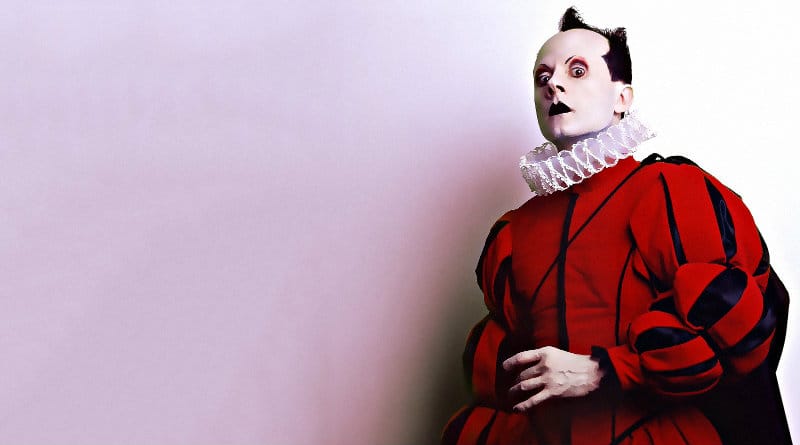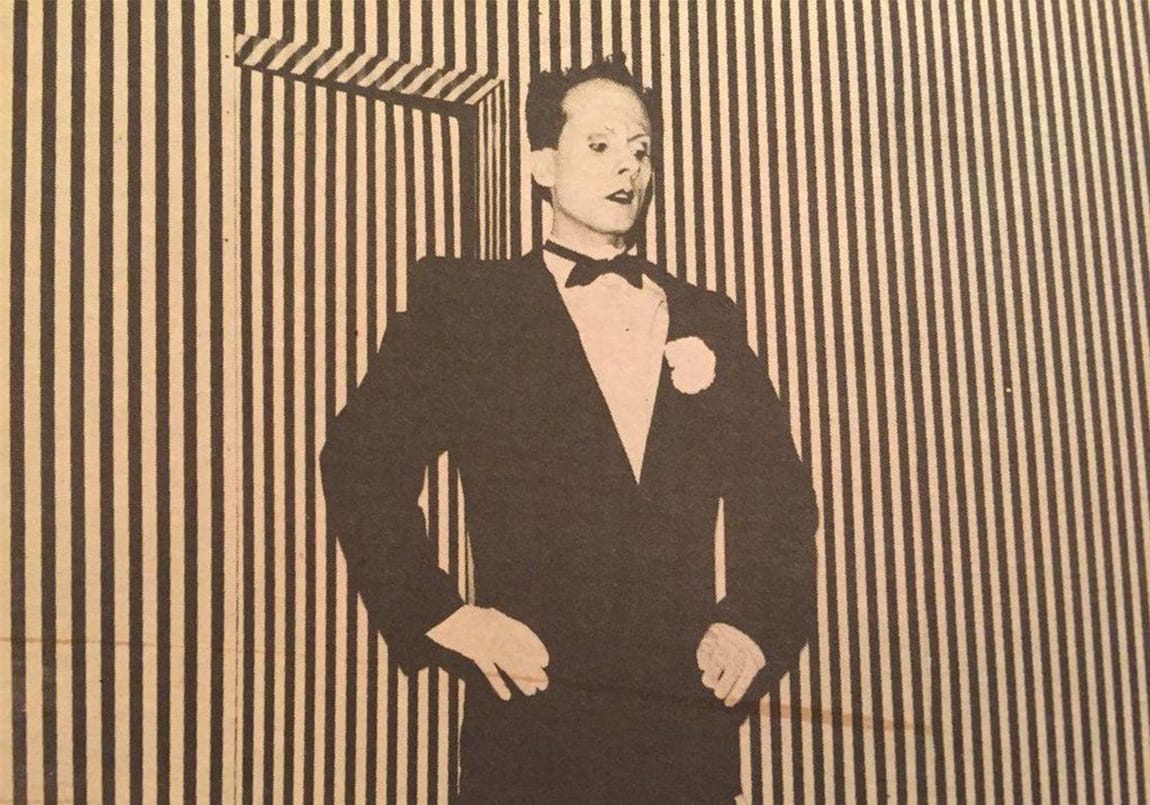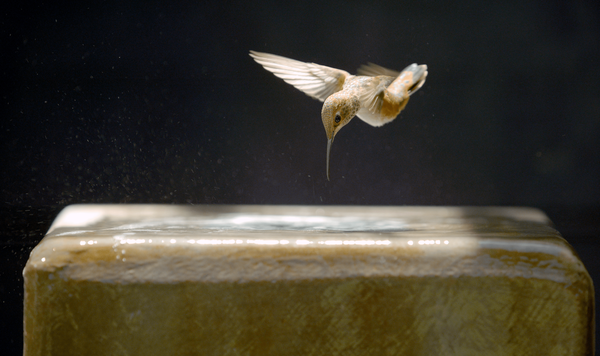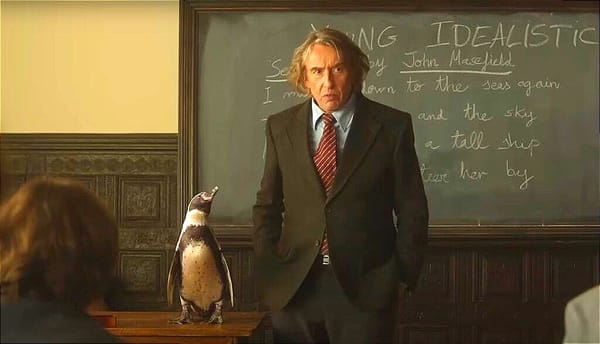One Good Film: "The Nomi Song"
Further time-tunneling into New Wave New York, courtesy of a lost interplanetary androgyne (no, not Bowie) and one of the author's favorite reviews.

Writing and posting about "Liquid Sky" the other day has sent me down a rabbit-hole – or is that a rat-hole? – of reminiscing about my post-college salad days in New York City during the late 1970s and early 1980s. The music, the movies, the dive bars and concert venues, friends I swore eternal kinship with over boilermakers at The Old Town and haven't heard from since. Eating kasha varnishkes in an East Village Russian diner at 3 a.m. Buying all my clothes at Canal Jeans. A giant polyurethane King Kong on the Empire State Building in the spring of 1983. A roommate throwing another roommate's vinyl single of "Under Pressure" out the window because he played it too often. A woman I vaguely remembered from college coming up the steps of Penn Station the Sunday after July 4th weekend, 1986. Marrying that woman five years later. A sense of freedom of movement for the price of a subway token, and the unacknowledged entitlement of being a young white guy in a city whose doors were still held open for people like me while slamming shut for people like Michael Griffith, Yusef Hawkins, Abner Louima, and the Central Park Five.
In short, the place or places you spent the years when you weren't quite you yet but all the potential versions of you tend to float back in synesthetic 3D when you hit a certain age. Or maybe we're privileged to live in an era of endless streaming mnemonic triggers, Proust's madeleines digitized and available 24-7 on Spotify or Amazon or Hulu. Is it nostalgia when you can buy it whenever you want on eBay? Something is missing, of course – some throb of energy that doesn't come through the artifact, no matter how close you hold it to your ear. Rosebud's down in the cellar with all the other junk, not out on the snowy hill with little Charlie Kane. I have playlists to jog the memory, aural photo albums, and they remind me of Saturday nights that lasted into the morning and Sunday mornings that stretched into the night, and still my knees hurt when I rise from my chair.
The New York City I knew, from 1979, when I first arrived, to 1991, when I got married and relocated to the suburban wilds of Brooklyn ("Why are you moving there?" asked my new father-in-law in bewilderment. "I spent years trying to get out") – that New York City no longer exists. Which is fine, which is natural. Unlike, say, Boston, New York sheds its skin as a matter of defining principle, completely reinventing itself every 15 years. All the stores, clubs, discos, restaurants, bands, record shops, comic shops, barber shops, and movie houses from my New York are long, long gone. The Strand bookstore is still there, and the Russian baths on East 10th Street, but I think that's about it. And the delis on every corner, although they no longer sell those blondie bars by the cash register I used to mainline on a regular basis. My younger child has been living in Brooklyn for the past two years, in a neighborhood that I was foolishly too scared to bike through in 1985. It's their New York now, but only for a while.
Related: I don't often read my old reviews, but there are a few I revisit occasionally, the way you'd flip through an old journal. Usually it's because I love the movie I was writing about and want to touch the experience of thinking about it again. In the case of the film below, the review allowed me to reach out to that vanished New York and will it back to life, however briefly, though the act of writing about a curious and talented man who far too briefly held the public stage. Or maybe it was only the myth of a man? Hard to say. "The Nomi Song" is not officially available for streaming but there's a fine copy on YouTube for the time being, linked here and embedded below the review, and I urge you to give it a watch, whether you were of that short, sweet-and-sour time or not.
'Nomi Song' Captures a Forgotten New-Wave Wonder
by Ty Burr, Globe staff
(Originally published in the Boston Globe on March 4, 2005)

Might as well start this off with a personal reminiscence. One night back in 1982, when I was a post-collegiate tadpole living in New York City, some friends dragged me to a club called Danceteria. We were drawn by a Village Voice listing featuring a tiny photo of what appeared to be a visitor from the court of an 18th Century Venusian emperor. His name was Klaus Nomi.
We got there late; the place was packed with a mix of the in-crowd and rubberneckers like us, and we stood way in the back. After an eternity, the scrim parted, dry ice billowed forth, and a human puppet appeared on stage. His hair was done in a corkscrew periwig, he wore a Kabuki/Dracula robe, and he moved disjointedly, like a robot running low on batteries. When he opened his mouth, the most angelic, bell-like falsetto I'd ever heard soared out over the club. After two synth-pop-opera numbers he was gone, and while some in our group thought it was the ripoff to end all ripoffs, others couldn't shake the bizarre singularity of what we'd just seen and heard.
A year later, Nomi was dead, but I and my friends didn't hear about it. The performance artist was part of the first wave of AIDS victims, back when people were still panicking over the "gay cancer." The media hadn't figured out how to respond and even Nomi's friends were too frightened to visit him in the hospital. (Was it contagious? No one knew.) He died with two little-selling albums under his belt and an appearance backing up David Bowie on "Saturday Night Live." Not much of legend to go on, really.
Yet here's Andrew Horn's documentary, "The Nomi Song" (⭐ ⭐ ⭐), and it's both a fullhearted memento of a unique (to say the least) personality and a precise evocation of a time and a place few have bothered to revisit: downtown Manhattan at the very dawn of the 80s.
After CBGB and before MTV, in other words. What most of us think of as "New Wave" was really punk rock tamed and made commercial – skinny ties, drum machines, Ric Ocasek taking "You're All I've Got Tonight" to the Top 40. "The Nomi Song" reminds the viewer that New Wave started as a genuine, if unfocused, artistic movement in the bowels of New York City during the late '70s. A fusing of punk's conceptual energy with Bowie-esque theatricality, gay camp, and a magpie sense of style, it provided the stage for a handful of memorable figures, none quite so out there as Nomi.
He was born in Essen, Germany, and studied voice in Berlin before moving to Manhattan, the place, as comedic performance artist and interviewee Ann Magnuson notes, where misfits could go to be stars "on our own terms." Nomi's terms were indelible and increasingly public, and in photos and hazy video footage from the era, we see him morph from a boyish exchange-student type into a baroque interplanetary butterfly.
Magnuson talks of weeping in a nightclub balcony as the singer stunned a punked-out crowd into awed silence with his act. Was it his voice, a trained countertenor that flew up into androgynous heights and that club emcees had to assure audiences was for real? Or was it the look, a Weimer-era hash-dream of alien visitation? With Nomi, you could only respond to the entire package, since nothing in it triangulated with anything in your prior experience.
"The Nomi Song" amusing and wistfully records how the artist and his crowd tried to make a success of it beyond the Mudd Club and other downtown haunts. There was a record contract, a hardheaded manager (Ron Johnsen, who here sounds vaguely incensed that he never figured out how to make money off the guy), the high point of the Bowie/"SNL" appearance.
The film's video clips play like long-ago bulletins from the front, unbearably touching in their once-avant garde naivete. Interviewees include journalist Alan Platt, musician Page Wood, artist Kenny Scharf (who lived one block over from Nomi and recalls shivering to the voice floating out over the courtyard), and Nomi's Aunt Trudy, who we only hear while director Horn animates paper cut-out photos of her. That's not a tactic that works particularly well, and the film's use of scenes from kitschy 50s sci-fi films similarly gets old quickly. Dates and other contextual underpinnings might have helped too.
But "The Nomi Song" succeeds at its main tasks. It recreates New Wave New York with Proustian force, from the Kiev (the diner) to Fiorucci (the clothing store). It recalls the last burst of anything-goes tumult before AIDS and the Reagan years lowered the boom. And it shows a strange and talented little man furiously reinventing himself according to Richard Hell's dictum that "you can be your own hero."
He almost made it. Nomi's career was just starting to take off in Europe – one of the last clips here, a spooky performance of Henry Purcell's "The Cold Song," hints he was moving into Phillip Glass territory – and his friends expected big things. And then he died. That night at Danceteria I think I saw as much of Klaus Nomi as anyone ever did: a moment of still, unearthly beauty, followed by a puff of smoke.
Feel free to leave a comment or add to someone else's.
If you enjoyed this post, please forward it to friends! And if you’re not a paying subscriber and would like to sign up for additional postings and to join the discussions — or just help underwrite this enterprise, for which the author would be eternally grateful — here’s how.





